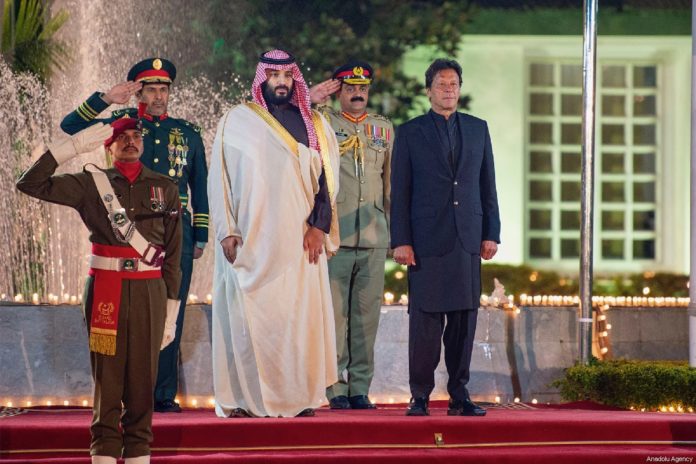I am the Ambassador of Pakistan in Saudi Arabia
H.E. Crown Prince Mohammed bin Salman Bilateral relations between Saudi Arabia and Pakistan have entered into a new phase of mutual trust and respect in terms of better political understanding, socio-economic integration, energy cooperation and strategic requirements. The recent visit of Crown Prince Mohammed bin Salman has further enhanced the “strategic partnership” between the two countries.
Saudi Arabia’s Crown Prince Mohammed bin Salman visit to Pakistan
On his maiden visit to Pakistan Crown Prince Mohammed bin Salman ordered the release of more than 2,000 Pakistani prisoners from Saudi prisons. He has a big heart which cares about the sufferings of common people, Pakistan bestowed its highest civilian honor on the Crown Prince. During his stay he oversaw the signing of unprecedented investment deals with Pakistan worth $20 billion.
Pakistani Prime Minister Imran Khan along with senior civilian and military officials received the Saudi leader at the Air Force base. Prime Minister Khan later himself drove him to the palatial prime minister’s complex where the two leaders held formal talks before overseeing the signing of agreements between their two delegations. During his speech Crown Prince Salman committed to invest more and more in Pakistan which would be further increased in coming days. Saudi’s foreign direct investment will be beneficial for both the countries, he added.
Prime Minister Welcomed Saudi Investments
Prime Minister Khan welcomed Saudi investment in areas of oil refining, petrochemicals, energy and other sectors. “We have CPEC (China-Pakistan Economic Corridor), we have links with China. So, we welcome Saudi Arabia to participate with us. It’s an exciting future,” the Pakistani prime minister said.
Pakistan’s Holy Connection with KSA
Pakistan enjoys strong political, cultural, economic and defense ties with Saudi Arabia. Saudi Arabia hosts more than 2.5 million Pakistani expatriates and is a key source of oil supplies for Islamabad on deferred payments, as well cash grants to help Pakistan’s often ailing economy. Moreover, we have a holy connection with Saudi Arabia which is dominated over all sectors in term of diplomatic ties.
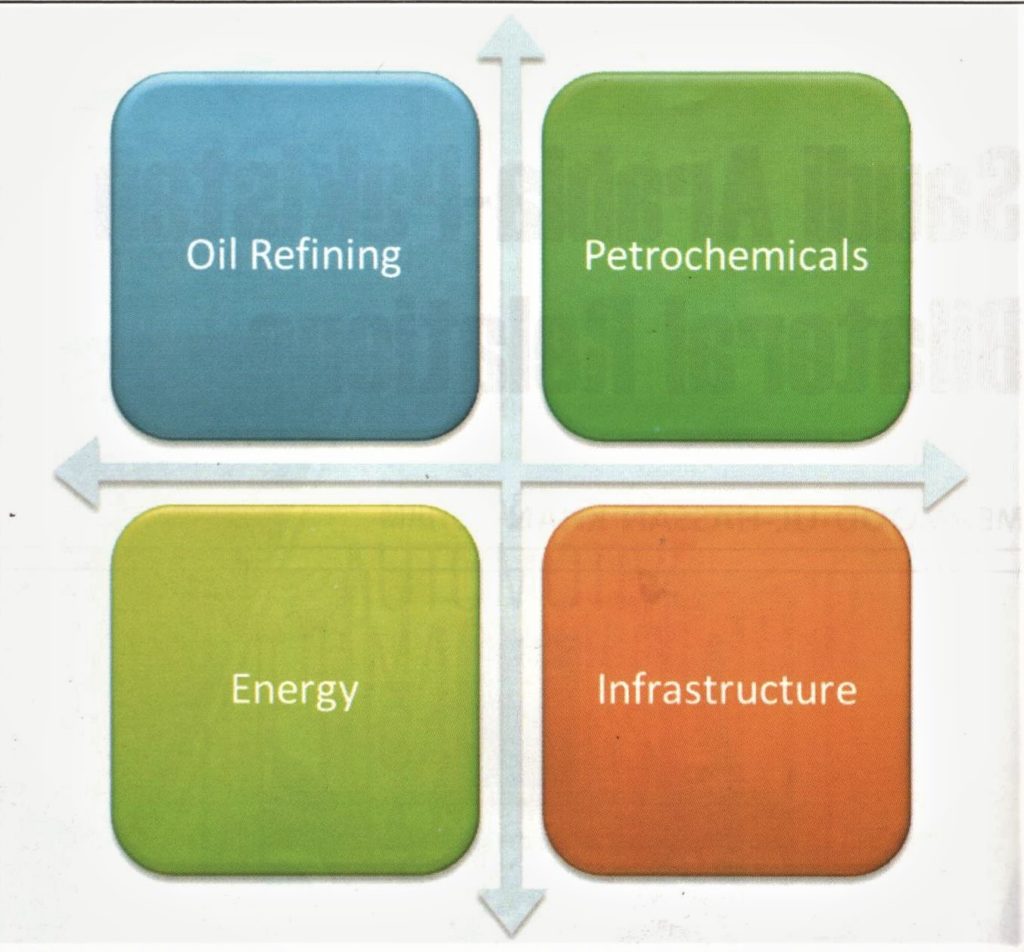
Oil Refinery in Gwadar
The agreements signed included an estimated $10 billion oil refinery in Gwadar where China has built and activated a major seaport under CPEC. It will be in place in next “3-5 years” in Gwadar and will meet the country’s needs of refined oil products currently being imported. The surplus will be exported to regional countries through the Arabian Sea port in Gwadar which China has built and activated under CPEC.
Value of Saudi’s Investments
The unprecedented Saudi investment is being viewed by Prime Minister Khan’s nascent government as a major boost for Pakistan, which is currently facing an economic crisis and balance of payments pressure. Pakistan is currently importing about 110,000 barrels per day (BPD) crude oil from Saudi Arabia, out of its total import of about 350,000 BPD.
I am on the opinion that the Saudi prince’s visit has assumed extra importance due to the prevailing situation in the region, especially in the backdrop of Riyadh-Tehran Iran rift. Pakistan needs Saudi money to stave off a huge IMF bail-out. Pakistan’s oil import bill amounted to $14.5 billion during the financial year ending on June 30, 2018, and could go up to $18bn this year with higher prices and increased consumption. It is estimated that Saudi investment will further strengthen Pakistan’s sinking foreign reserves.
Moreover, Saudi Arabia has played a contributory role in de-escalation between Pakistan and India which is highly appreciated.
New Chapter
The visit laid the foundation for a new chapter in Saudi-Pakistan relationship, marked by high level institutional framework to guide future direction of political, diplomatic, economic, investment, trade, people to people, Defence, security and cultural aspects.
Establishment of Supreme Coordination Council
The establishment of Supreme Coordination Council, its subsidiary mechanism and the Council’s inaugural session in Islamabad were one of the key steps in shaping the new trajectory in the bilateral relationship.
Joint Statement
The joint statement, while reaffirming the historic relationship between the two brotherly countries, applauded the growing momentum in bilateral ties in all areas. The Saudi side praised Prime Minister Imran Khan’s dialogue offer to India including the initiative on opening of Kartarpur corridor.
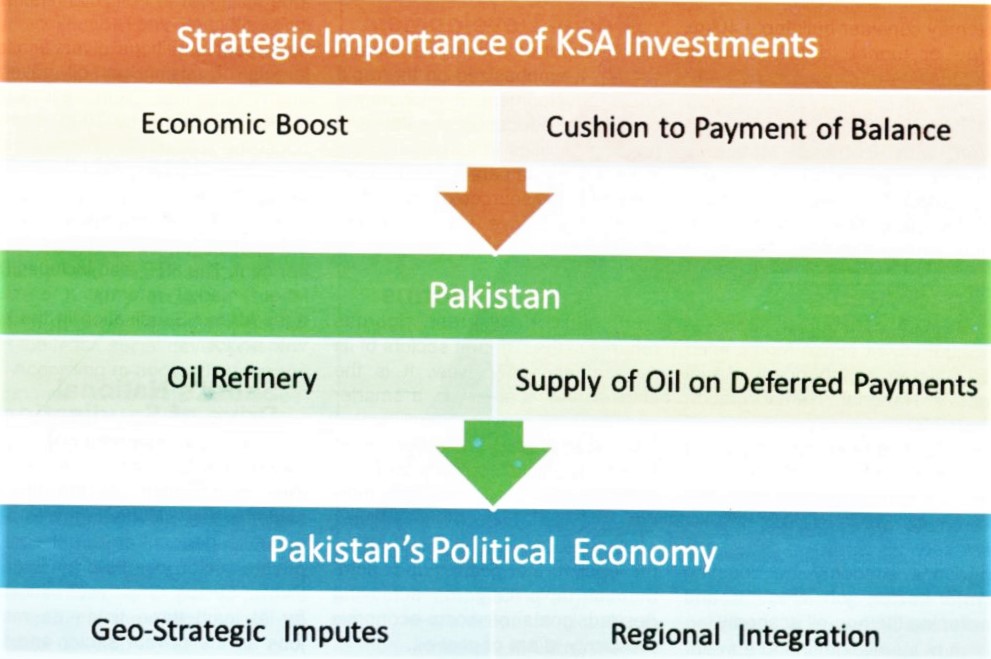
Peace & Stability
Both sides stressed that dialogue is the only way to ensure peace and stability in the region and to resolve the outstanding issues. Both sides strongly condemned the atrocities and human rights violations committed against Muslims around the world.
The Prime Minister briefed the Crown Prince on the grave human rights violations in IOK and the need for resolution of Jammu and Kashmir dispute in accordance with UN Security Council resolutions and wishes of the Kashmiri people.
The statement also articulates the common positions of the two countries on a range of regional peace and security and international issues including inter alia challenges faced by the Islamic Ummah, interfaith harmony, counter terrorism, among others. At the conclusion of its visit, both countries signed four memoranda of understanding (MoUs) for oil and mineral sector investment and trade cooperation.
Pakistan is ready to allocate a large piece of land at Gwadar for setting up a 500,000 barrels per day (BPD) refinery worth over $10 billion besides an oil storage facility for 2-3 million tonnes as part of its plan to secure its export supplies. On part of Saudi Arabia, it wants to further diversify its energy production and supplies.
It may consider building a 40km bridge or tunnel to link Gwadar with Muscat and Oman at the bank of Strait of Hormuz on one side and connect its industrial city of Jazan with Eritrea’s Massawa region through a 440km tunnel across the Red Sea. The land route between Muscat and Jazan port is around 2200km.
Saudi Arabia’s Vision 2030
Saudi crown prince Mohammed bin Salman announced Saudi Arabia’s National Transformation Plan (NTP).
It would radically transform the Kingdom’s economy. Vision 2030 sets out a comprehensive road map to promote more efficient government services and to diversify the Kingdom’s economy by boosting private sector, job creation and developing the non-oil economy.
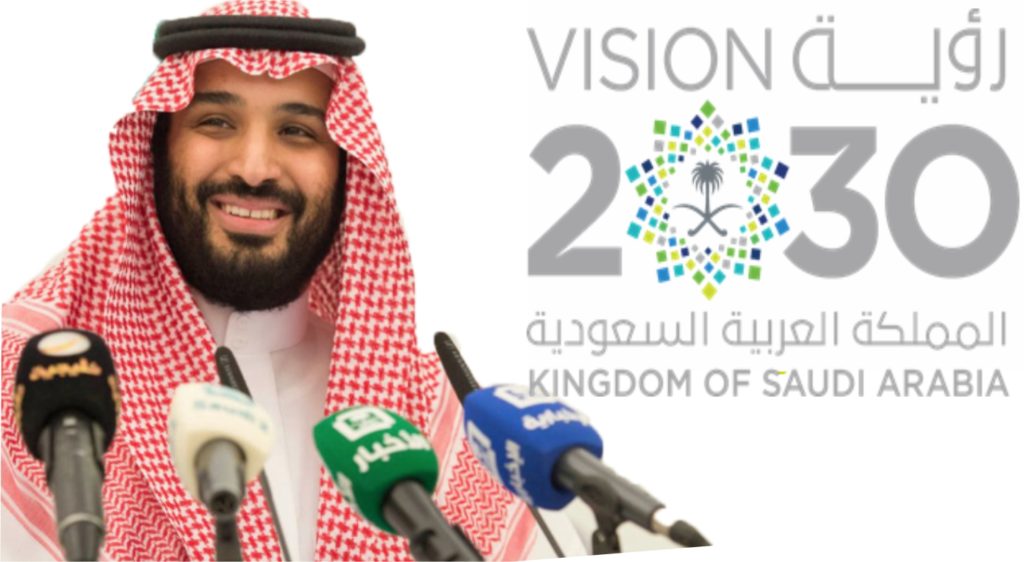
Key Elements of Vision 2030
It outlined the key elements to shift the kingdom’s economy away from its dependence on oil. It was meant to further diversifying its macro-economy. It further liberalized its national economy. It envisioned attracting more and more foreign direct investments in the different sectors of production and survival in the country. It encouraged boosting private sector in order to speed up business activities in the Kingdom.
It included regulatory, budget and policy short, medium and long terms reforms that will be implemented over the next 15 years in the hope of making the country less reliant on crude oil. It started new chapter in its economy which is heavily dependent on black gold to a new smarter economy. It aimed to build a prosperous and sustainable economic future for the country.
Social Development
It supported having a vibrant society. It emphasized on the rapid social development. It encouraged qualitative education, health and housing facilities to its countrymen. Indeed, it was a paradigm shift from the traditional sources of production to more innovative. It was the start of new era in the Kingdom.
Rigorous Reforms
It outlined different rigorous reforms in the different sectors of its national economy. Now, it is the start of new chapter i.e., a smarter economy. Moreover, Saudi Arabia introduced a new $ 2 trillion mega fund to generate more new jobs, further diversification of economy, markets, services, financial derivatives, banking industry and the last but not the least, further gearing up of commercial diplomacy for achieving desired goals of socio-economic prosperity in ear of post-oil.
The NTP is the centerpiece of the “Vision 2030” reforms set out in the earlier part of this year. He planned to change the country’s public sector-dependent and promoted and fostered private sector entrepreneurial spirit. The NTP initially focused to partly privatize the state oil company, Aramco, which dominates the Saudi economy so far. A small portion less than 5 per cent of the commercially delineated part of the company would be listed. According to the plan, the ownership of Saudi Aramco will then be transferred to the state’s Public Investment Fund, which will help bolster it into a sovereign wealth fund valued at up to $3tn, the world’s largest, with a mandate to kick-start domestic investment.
Privatization of Government Assets
Privatizing government assets from Saudi Aramco to other assets in healthcare and education, will help meet ambitious diversification targets of raising non-oil government revenue from SR163bn ($43bn) to SR1tn by 2030, and to boost the role of the private sector from 40 per cent to 65 per cent of gross domestic product by 2030 and that of small and medium-sized enterprises from 20 per cent to 35 per cent. The NTP also includes the labour market reforms. It encourages further Saudisation in the private sector.
Saudi’s National Drive of Saudisation
The Saudi government’s labour report last October 2017 showed that “Saudisation” of the private sector is very slow going, with only about 15 percent or 22 percent of private-sector jobs held by Saudis. Public sector employees account for at least three times as many jobs as the private sector and the labour market report forecast that Saudis will need 2.2 million private sector jobs by 2025 to reach to full employment.
Job Creation
It also aims to reduce unemployment from 11.6 percent to 7 percent by 2030. It is seen as essential to end the Kingdom’s reliance on lower-paid foreign labor. It means a renewed focus on education, as well as a higher female participation in the workforce (from 22 percent to 30 percent).
More than half of the population is under 25, many younger Saudis hope that economic transformation will lead to a less stifling and a more equitable society. And job creation is rightly seen as a progressive tool in averting disaffection. This is another key step for reform is the drastic change in the education system. Now it will focus more on the skills needed for a modern economy. Institutionalization of technical education, knowledge-based economy and promotion of higher education will be achieved through rigorous reforms announced in the NTP.
Main Themes of Vision 2030
Vision 2030 is the “way forward” for the Kingdom, it provides the essential elements for survival i.e., stability and sustainability in the fields of national economy, society, civility, governance and the last but not the least, social development.
According to above diagram the economic theme puts clear guidelines on the methodology to diversify the economy away from oil, and reducing the reliance on government spending as the main source for growth. According to this theme, through a combination of initiatives, including investment, privatization, and public-private partnerships, the Kingdom will be able to develop entirely new economic sectors. Broader goals that will ensure a thriving economy include raising the share of non-oil private sector GDP from 40 percent to 65 percent.
It also includes an ambitious target of increasing the Kingdom’s ranking, in terms of GDP size, from 19th to be among the top 15 countries in the world. The NTP highlighted that the country would raise its share of non-oil exports in non-oil gross domestic product (GDP) from 16 percent to 50 percent till 2030. It geared up further privatization in the country along with creation of the largest sovereign wealth fund in the world.
Sovereign Wealth
Sovereign wealth fund could top $2 trillion and would be linked to its vast revenues from oil. It would smooth the process of listing private Saudi companies and state-owned enterprises, including Aramco. It would require deepening liquidity in its money markets, fortifying the role of the debt market and paving the way for the derivatives market.
Renewable Energy
The planned economic diversification also involved localizing renewable energy and industrial equipment sectors and creating high-quality tourism attractions. It also plans to make it easier to apply for visas and hoped to create 90,000 job opportunities in its mining sector.
Vision 2030 also included announcements in digital infrastructure, culture, education and the military. Prince Mohammed is confident that Saudi Arabia could achieve its vision 2030 with oil at just $30 a barrel.
Empowerment of Women
One of the salient features of its vision 2030 is further empowerment of women in the society. It would increase women workforce from 22 percent to 30 percent. It would lower the rate of unemployment from 11.6 percent to 7 percent.
With over 50 percent of KSA university graduates being female, we will continue to develop their talents, invest in their productive capabilities and enable them to strengthen their future and contribute to the development of our society and economy.
Promoting Public-Private Partnership
Promoting public private partnership would remain the cornerstone of vision 2030. In order to generate the finances/ resources and to diversify the macro-economy away from oil on a permanent footing a number of very interesting and bold initiatives have been envisaged under NTP.
Tourism
Tourism is one of the main sectors under the NTP. Now more focus would be on promoting religious tourism on scientific grounds in the Kingdom. According to the Kingdom’s national figures, eight million people visit Saudi Arabia for Umrah every year. As per the plan, in 2020, some 15 million people will visit to Saudi Arabia for Umrah and by 2030 this number is projected to hit 30 million. The new Jeddah Airport will serve this vision in a very big way as will Al-Taif Airport as it will receive large numbers and accommodate these numbers. The infrastructure of Makkah is strong. Haramain Train will support these figures. Now, we are trying to finish the Makkah Metro as soon as possible.
Saudi Arabia also plans to open its door for tourism for all nationalities, indeed, in accordance with our values and beliefs. It would generate additional income for the country too. From Umrah and Haj, the Kingdom could generate revenues of over SR200 billion ($53b) by the year 2020.
| Main Themes | Details |
| Vision 2030 | A giant leap towards further diversification of economy, resources. Production And System. |
| Thriving Economy | Further Liberalized, further privatized. Further activation of private sector |
| Ambitious Nation | People friendly governance, Interactive, responsive & transparent system |
| Vibrant Society | Qualitive life, Provision of Basic necessities of life and social unity & harmony |
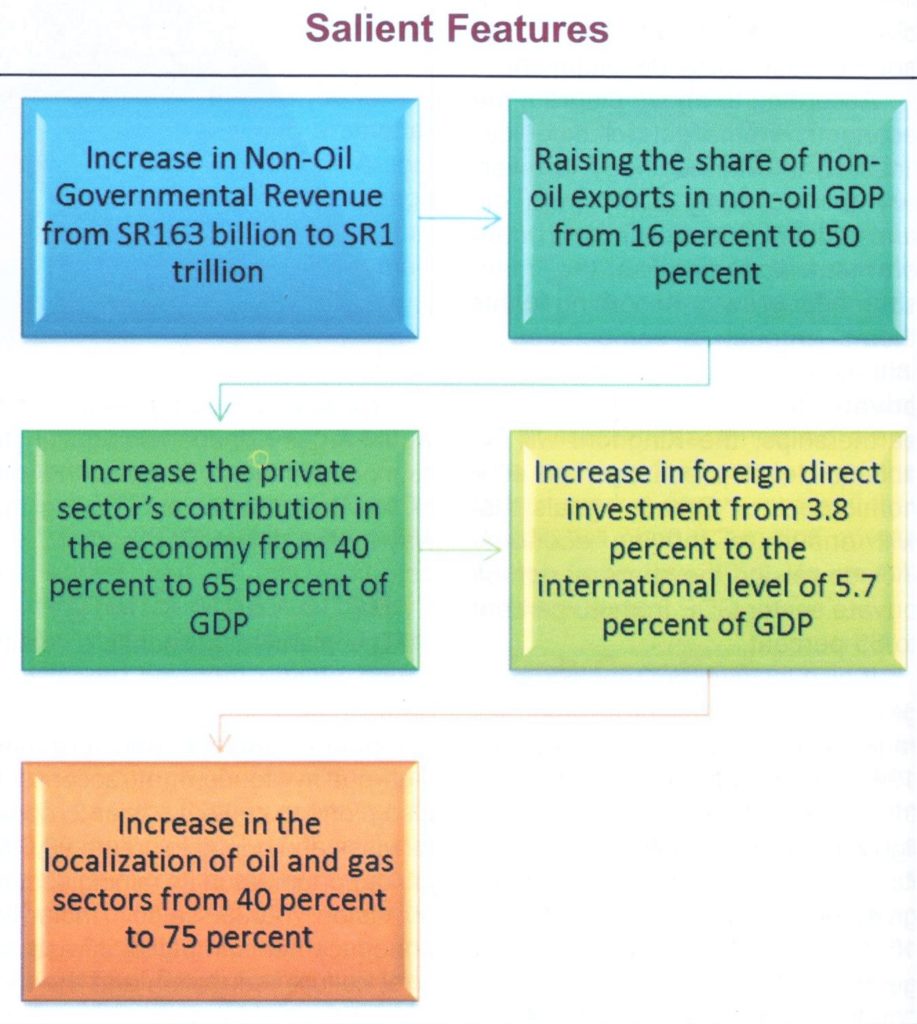
Broadening of Non-Oil Revenue
According to Vision 2030, the Kingdom plans to broaden non-oil revenue and a plan to tax the wealthy is also on cards. As per the Vision 2030, Riyadh plans to generate at least an additional $30 billion from subsidy reform and another $10 billion from value added tax.
Revolutionized of Labour Market
Vision 2030 would revolutionize labour market, especially the expatriate community living in the Kingdom. It wants to capitalize on this funding source by giving long-term residency rights to expats living in the Kingdom for a considerable period of time and by allowing them to legally invest in the country and buy property. The permanent residence, or “green card”; system in the Kingdom will generate around $10 billion annually through reduced remittances and other sources, besides bringing in billions of dollars in foreign investment.
Abolishing of the existing sponsorship system
Vision 2030 will abolish the existing sponsorship system for holders who will be required to pay zakat and value-added tax, if any, besides premiums on insurance, etc. The plan, to be implemented over the next five years would permit the long-term expats to own property and undertake commercial, industrial and related activities. It is hoped that the Vision 2030 will generate at least $10 billion in revenues annually.
Vision 2030 outlines a path that the Kingdom will take in order to build a thriving country and economy, setting out long-term goals and expectations. It highlights how Saudi Arabia’s key strengths and capabilities can be turned into enabling tools to help transform Saudi Arabia over the next 15 years. It sees the Kingdom’s religious and cultural heritage, investment prowess, and locational advantage playing a vital role in moving the economy forward.
Saudi Arabia witnessed extraordinary expansionary cycle in its macro-economy over the last 10 years due to which the economy is now among the largest in the world, it remains reliant on government spending and subsidies. Between 2005 and 2015, current expenditure, government spending increased significantly from SR284 billion to SR673 billion. But spending is still mainly financed by oil revenues. Over the past five years, 87 percent of the annual share of government revenues has come from oil. Vision 2030 would gradually reduce oil share of GDP in the days to come and would further strengthen its macro-economy through diversification drive.
Reduction of Subsidies
The Vision also seeks to set clear subsidy criteria, including on fuel, food, water, and electricity, in order to create a more equitable distribution. It will significantly improve the fiscal balance. To help achieve the Vision, several major transformative and executive programs have been identified, some of which have already been underway, while others were announced for the first time.
According to Vision 2030 the new economy will be built on three core strengths: Kingdom and Islamic leadership; the country’s strategic geographic location as a hub connecting Asia, Africa and Europe; and vast natural resources, including uranium, gold, silver, aluminum, iron and phosphate, in addition to oil and gas.
Saudi Arabia’s Vision 2030 is a comprehensive program which seeks to transform the entire state into a new country that ranks high among the developed nations. It is not limited to economic growth, rather it also includes social, humanitarian, developmental, military, and performance aspects.
The vision focuses on transparency and good governance, and eliminating leniency or tolerance for corruption at any level. It speaks directly about corruption and this is the first step to fighting it.
The vision also speaks of detailed reviews of all government structures and procedures so as to ensure clear separation between the decision-making process, the implementation, and the monitoring of such implementation and performance. It is very important as it guarantees transparency in monitoring performance and achieving results.
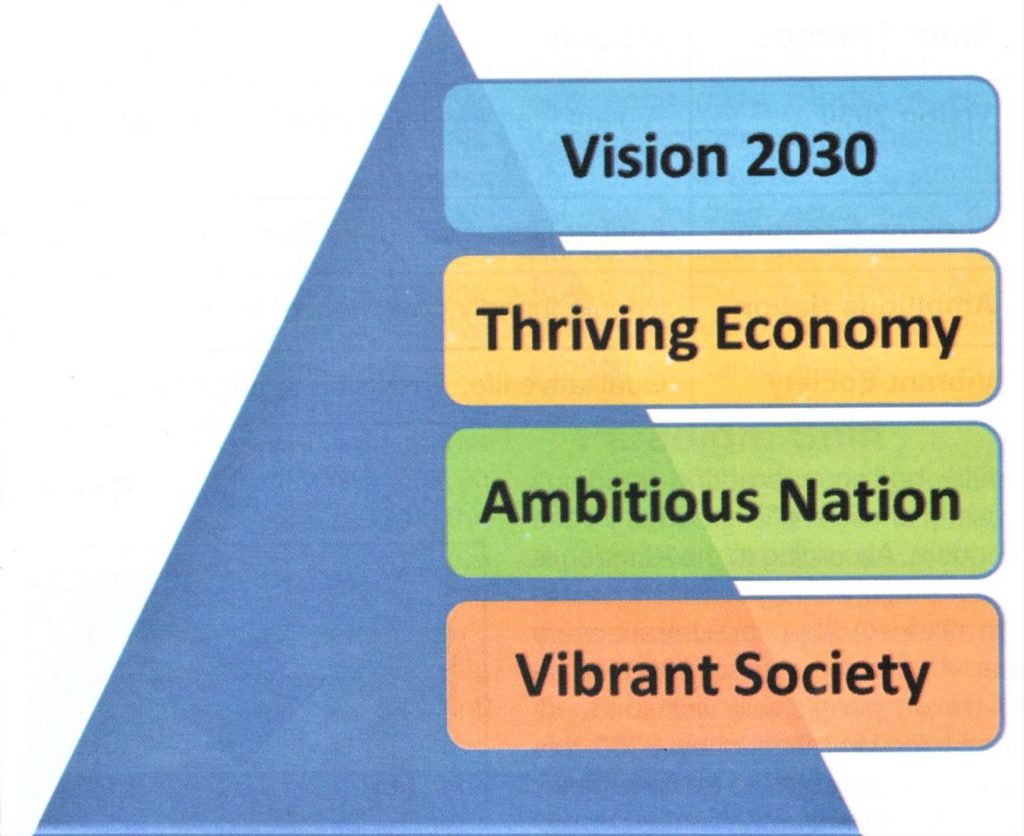
The further development of King Abdullah Port has special sway in its vision 2030. It would further revolutionize its aviation industry in the days to come. In many areas of the world, ports have helped build cities and economies. Ports of Hong Kong, Singapore, Shanghai, Dubai and New York have played substantial role in their economies. King Abdullah Port is pivotal to the King Abdullah Economic City, subsequently contributing to the overall economy of Saudi Arabia.
Paradigm Shift
Vision 2030 is a paradigm shift. It encourages having more and more renewables through its national drive of diversification of economy and resources. It upholds the traditions of transparency, accountability, liberalization, privatization and the last but not the least, openness its every aspect of its national life. It promotes non-oil sectors of the economy. It reduces oil share of GDP so that its macro-economy would be more stable and sustained. It creates a successful partnership between private sector investors and the government that will be the critical factor in shaping Saudi Arabia’s development over the coming five years.
In its Vision 2030 strategy, Riyadh has set itself the target of increasing the private sector’s contribution to GDP from 40 percent today to 65 percent by 2030, and growing non-oil government revenues from SR163 billion ($43 billion) to SR1 trillion ($267 billion) by the end of the next decade. It is hoped that the Vision 2030 strategy will change the business landscape in the kingdom, the government’s priorities and the strategies of businesses seeking to take advantage of the new opportunities being created in the kingdom.
With government debt rising sharply in the wake of the collapse in oil prices, Riyadh is exploring using public-private partnerships (PPP) for its most important infrastructure projects. And with a raft of road, rail, port and airport projects planned, the report looks at how PPP and other financing models will be used to deliver transport projects.
Crown Prince Mohammed bin Salman: A Visionary Personality
Big and broad visions produce drastic change. Global experiences show us that large and complex success stories began with such visions. The experience of Singapore, for example, began with the vision of its leader who transformed a small island into a highly successful economy as well as a global commercial center. Lee Kuan Yew, the man behind Singapore’s renaissance, once said:” Make the man before anything; secure facilities and services and then make him use them in a clean and civilized manner, and pay attention to the details of everyday life”.
Similarly, Mahathir Mohamad, the former prime minister of Malaysia who spearheaded its transformation and believed in the power of initiative to bring about change, once said: Economic and social development does not occur overnight; people have to move to create it.
We also know stories of individuals who had the vision to produce change. Steve Jobs, the successful founder of Apple had a clear vision for the future and, as a result, was able to produce the most successful company of our time. As he once famously said: Innovation distinguishes a leader from a follower.
I think there are critical aspects of this vision that have yet to gain full attention. Social values, as the vision says, will be based on moderation, tolerance, perfection, discipline, justice, and transparency, and our focus will be on achieving growth of these values and areas. These are important elements for the next stage as the vision seeks to achieve a productive society rather than a consuming one. The principles of tolerance and moderation are a cure for many social phenomena that arise from those whose aim is to spread extremism and radicalization.
Crown Prince Mohammed bin Salman, the architect of Vision 2030
Crown Prince Mohammed bin Salman, the architect of Vision 2030, has revealed his expectations for the future of Saudi Arabia in several press interviews with the international media. These expectations and aspirations carry high hopes for future Saudi generations. On a personal level, I agree with most of what he proposed, but I disagree with him on the subject of women driving. That it is a social issue which the Saudi society must deal with. I believe that the time has come and is ripe for that issue to be resolved.
Other important steps were also announced, namely the strengthening of governance by establishing clearly defined terms of reference that allow for flexibility and accountability. An office for strategic management will be set up at the Council of Economic and Developmental Affairs and will work on preventing duplications or inconsistencies. A center will also support decision-making at the Royal Court and provide information and necessary data to support decision-making processes.
These two centers are critical to ensuring the success of the vision’s strategy, regardless of who the decision-makers are, and they will also ensure harmony of policies. The number of authorities that will be formed to guarantee execution and monitoring of the vision and its performance on a monthly basis will increase chances for success.
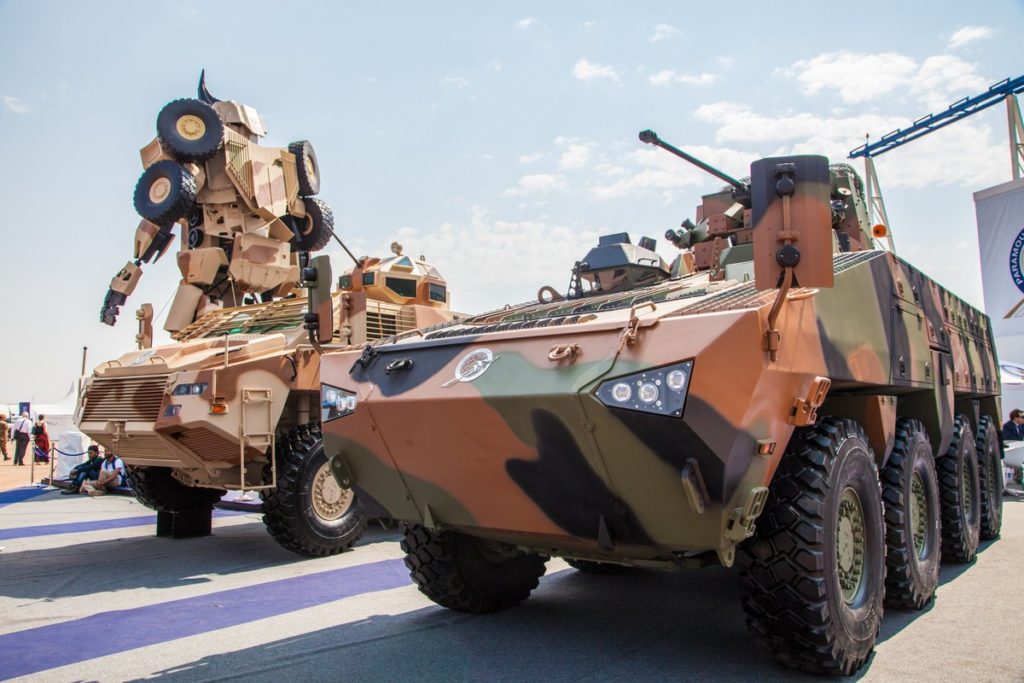
Paramount Role of KSA
The Kingdom of Saudi Arabia plays a crucial role in global and regional economic developments. It is a leading player in strengthening partnerships with Arab bilateral and multilateral partners for development assistance and scaling up support for countries in transition in many parts of the world. Despite global weak economic conditions and ongoing financial crunch, it is one of the fastest and most stable economic growth patterns in the world. Undoubtedly it holds a spiritual, economic, and political position that is rarely seen and is respected all over the world.
KSA: Largest Economy in GCC & MENA
Saudi Arabia is the largest economy in the Gulf Cooperation Council (GCC) and Middle East and North Africa (MENA) and of course an active member of the G-20. It has been one of the major shareholders in many generous humanitarian programs in the world that have successfully turned tears into smiles. Moreover, it also plays an important role in regional and global economic development as a major source of energy, overseas development assistance, foreign direct investment and remittances.
Miraculous Socio-Economic Transformation
It achieved miraculous socio-economic transformation and massive geo-political and geo-strategic importance because of the strategies that have been implemented since the rule of its founder King Abdul aziz Al Saud until today.
Diversification of Economy
The Saudi Arabian government has diversified its macro-economy through power generation, telecommunications, natural gas exploration and petrochemical sectors. To attract foreign direct investment, the country acceded to WTO in 2005. It carried a multi-billion dollar development strategy to build six Greenfield economic cities and industrial zones in the country. By 2020, the industrial cities will generate USD 150 billion in GDP and create 1.3 million jobs. Its sincere efforts to shift from an oil-based economy to a knowledge-based economy are substantiated by the record non-oil exports in 2013. Exports oriented policies achieved current account surplus.
It derived economic diversification to shift away from a volatile oil-centric economy. Now, it has the potential to reduce the impact of any future international financial crises, and is also creating significant investment and financing opportunities. Recent announcements such as increase in the use of unconventional gas supplies, solar energy adoption, introduction of nuclear and renewable energy are value-addition. Its diversification of economy has increased its net foreign assets by nearly $166 billion in 2012 and the funds are set to surpass $one trillion for the first time in the Kingdom’s history.
Saudi Arabia’s Balanced Foreign Policies
Saudi Arabia’s balanced foreign policies and its sincere efforts in maintaining peace and security in the GCC, MENA and around the world and its strong political commitments towards solving regional conflicts and helping struggling people affected by disasters, has affirmed its central and rather important role on the regional and global political map. It principally played reconciliatory role in Bahrain, Oman, Jordan, and Morocco and succeeded to save these countries from political turmoil, economic meltdown, ethnic division and the last but not the least, foreign aggression and infiltration.
KSA Peaceful Transition in Middle East
Saudi Arabia through financial and diplomatic means arranged a peaceful transition of power in many countries of the Middle East. It also helped Tunisia, Egypt and Pakistan to overcome difficult times in the near past. Saudi Arabia has also denounced the brutal Israeli aggression on the Palestinians in Gaza and has urged the UN Security Council and the Human Rights Council to realize their responsibilities and apply the Fourth Geneva Convention against Israel to stop its crimes and atrocities against the Palestinian people.
Its rigorous diplomatic efforts and massive humanitarian programs in Syria is high appreciable. It is also leading role in the further strengthening of GCC unity. Most recently, Saudi Arabia diplomatically enhanced its ties within GCC in order to tackle the emerging socio-economic obstacles, geo-political trends and geo-strategic issues in and around the region.
Concluding Remarks
Saudi Arabia and Pakistan have maintained religious, economic, social, and security ties for the last 72 years. Saudi Arabia established diplomatic relations shortly after Pakistan emerged as an independent state and have remained robust since then. In 1951 both countries concluded a Treaty of Friendship, which laid the foundation for a wide-ranging strategic, political, military and economic cooperation in coming decades. Political relations between the two nations got a boost with the visit of King Saud Bin Abdul Aziz to Pakistan in 1954.
Starting from their first bilateral “defense pact” Saudi Arabia and Pakistan have remained steadfast military allies. Saudi Arabia’s defense needs, in the 1960’s, led it to establish comprehensive relations with Pakistan. In the subsequent decades, these relations further matured and deepened manifold. Pakistan continues to train Saudi defense personnel. From 2004 Pakistan army and Saudi land forces have also commenced joint exercises called the Al-Assam the first two exercises of this series, Al-Assam I II, were conducted in Pakistan in 2004 and 2006 while Al-Assam III was held in Saudi Arabia in 2009. In 2011, three-week long exercises focusing on enhancing the combat capabilities of Saudi troops in counter-terrorism operations in a low-intensity conflict environment were conducted in Pakistan.
Strategic and economic cooperation between the two brotherly countries deepened as human capital requirements of Saudi Arabia and Pakistan’s need for economic assistance brought the two countries closer. Continuity in their relations and the role both countries have played in the wider Islamic world has made this relationship a special one. The two states continue to regularly hold consultations at the highest political level on regional and global security issues, while pursuing independent policies based on their respective national interests.
Saudi Arabia has always stood with Pakistan in difficult times and the Pakistani government and its people acknowledge it. Saudi Arabia and Pakistan have always enjoyed close relations, primarily because of brotherhood, religious, political and cultural ties. Ties between Pakistan and Saudi Arabia have been strong for decades with hardly been any misunderstandings to speak of. The most recent visit of Crown Prince Mohammed bin Salman to Pakistan will lead to further strengthening these ties. As for Saudi Arabia, Crown Prince Mohammed bin Salman told Prime Minister Imran Khan to consider him the “AMBASSADOR OF PAKISTAN” in Saudi Arabia. MBS also ordered the immediate release of Pakistani prisoners in the kingdom.
Both countries are affiliated with the Organization of Islamic Cooperation (OIC). The Saudis have been very generous when it comes to providing aid to Pakistan. For example, when a devastating earthquake hit Balochistan in 2005, Saudi Arabia supported Pakistan with $10 million in humanitarian aid. Moreover, when floods swept across Pakistan in 2010 and 2011, Saudi Arabia granted Pakistan $170 million for relief operations and reconstruction activities in the affected areas.
Pakistan’s main imports from Saudi Arabia consist of crude oil and oil-based products. In return, Pakistan’s export includes rice, meat products, spices, textiles, chemicals, footwear, and leather goods. The total value of bilateral trade is around $2.5 billion. In January 2018, Saudi Arabia and Pakistan pledged to strengthen their economic ties with a preferential trade agreement that would fit in with Crown Prince Mohammed bin Salman’s Vision 2030.
The Kingdom of Saudi Arabia, largest economy in the GCC and MENA always plays very important role in the peace, harmony and stability of the region and world alike. It is seriously advocating having GCC joint security shield, energy cooperation, food security, joint strategy against terrorism, extremism. It is also an active member of G-20 and plays its supportive role through international assistance and easy and smooth supply of oil. Now, Saudi Arabia is one of the fastest growing markets in built-assets among the world’s 30 highest grossing countries in the world.
2018 has seen the government push ahead with its Vision 2030 program. The government’s efforts to secure the long-term fiscal outlook are continuing with vigour. VAT has been introduced, energy prices have been raised, and fees on expatriate workers and their families have been rolled out: a SR100-a-month fee on expat dependents was introduced in July 2017, rising to SR400 a month by July 2020. As well as raising revenue, the expatriate fee is designed to encourage private sector employers to take on more Saudi nationals.
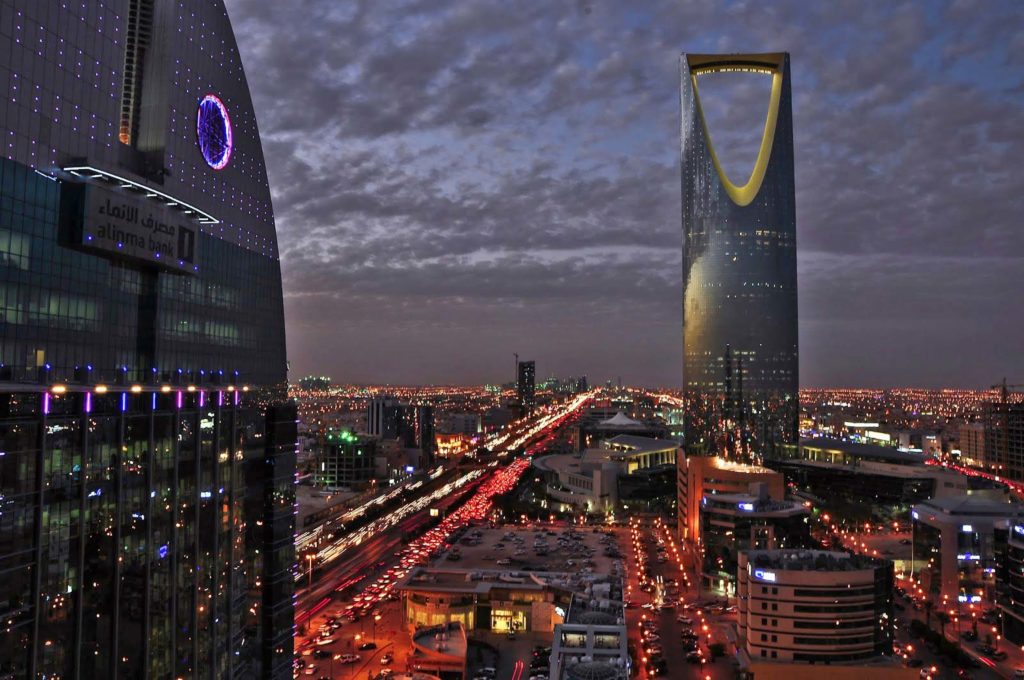
The Kingdom of Saudi Arabia is well known for its generous humanitarian assistance, diplomacy, conflict resolution and reconciliation spirits throughout the world. In religious terms it stands for brotherhood, charity and divine revelations. It has been icon of the Muslim Ummah and Muslim nations the world over since its inception because of its friendly and supportive policies towards the socio-economic prosperity and political unity. Its strong political commitments to fight against terrorism are appreciable. Its interfaith dialogue, tolerance, and cultural diplomacy are making bridges of better understanding, oneness and togetherness about others around the globe.
Saudi Arabia has been experiencing rapid changes over the past few years, particularly since the death of King Abdullah in 2015. These changes encompass domestic issues, such as increased rights for women and more relaxed social norms, as well as external postures, most notably a more muscular foreign policy emanating from Riyadh. The driving force behind the kingdom’s rapid changes is Crown Prince Mohammed bin Salman.
There is an urgent need for the further strengthening of socio-economic ties, energy cooperation in terms of renewable energy (solar, wind), energy exploration (oil, gas, shale), infrastructural development, joint ventures especially in military production, cooperation in Small and Medium Enterprises (SMEs), mineral cooperation, tourism, banking and finance cooperation and the last but not the least, better political understanding to resolve regional security crisis of Afghanistan, Syria, Yemen for achieving a befitting proposition in the days to come. Agro-economy and its development between two states may open new wind of opportunity in the days to come. Food security is threat to so many countries and Pakistan may provide its solution to Saudi Arabia. Exchange of modern water technologies may bring desired benefits for Pakistan.
Counter terrorism is another sector where both countries can extend their cooperation. Rise to non-state actors and its widespread sanctuaries in the region and around the globe need a closed liaison between the two states. Cyber security cooperation is the need of the hour because of its looming threats and consequences in the future. Moreover, bilateral relations in the fields of civil aviation, space science, laser technologies and anti-missile parameters/ equipment may be beneficial for both the countries. Joint ventures in various military productions may be another befitting sector to explore in the days to come.


